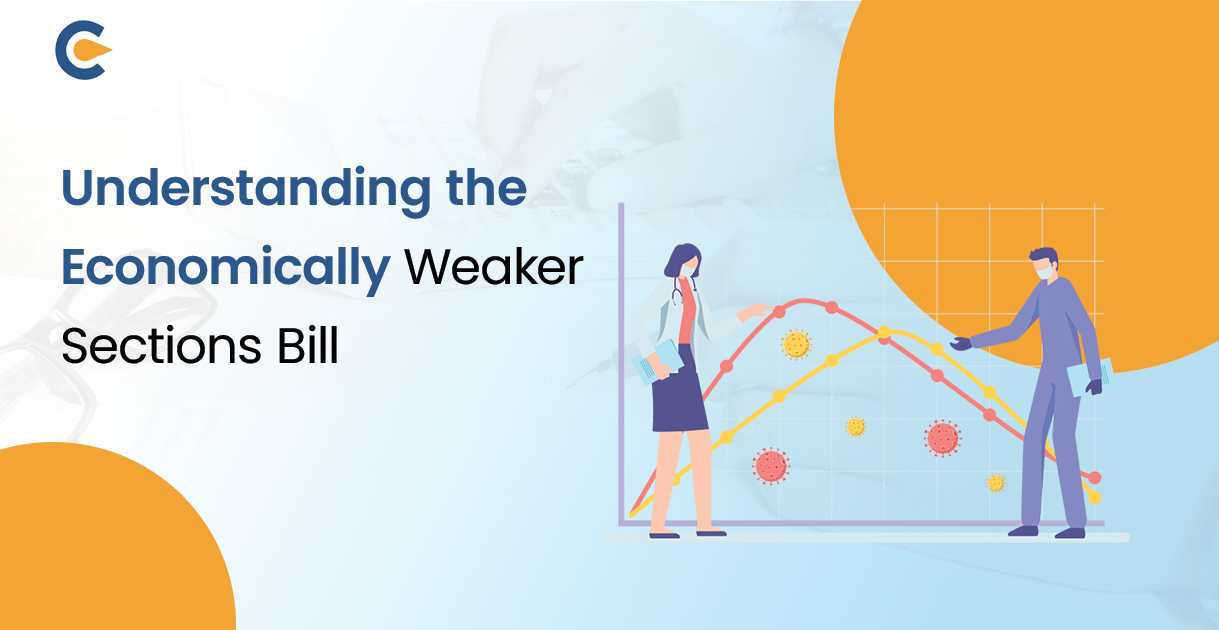To improve the economic stability of the weaker section in India, the Economically Weaker Sections Bill was issued by the Ministry of Social Justice and Empowerment. Article 15 (4) and Article 16 (4) were brought forward with the Economically Weaker Sections Bill. The Economically Weaker Sections Bill was sanctioned for the advantages of the scheme. The income will be the main factor in deciding the eligibility criteria for the EWS Bill application.
The Economically Weaker Sections Bill is not similar to the OBC reservation that is already present. It applies to the general category only. Applicants who are not getting any benefits from ST, SC, or OBC can also apply under the Economically Weaker Sections Bill. The main aim of this Bill was to promote equality and eliminate social backwardness and economic weakness.
What is the Economically Weaker Section?
The Government of India has introduced the Economically Weaker Sections Bill and the ten percent reservation. In this Economically Weaker Sections Bill, the people who are already included in the ST/ST/OBC are not included. The Economically Weaker Section means that section of society that belongs to the category of unreserved and whose family annual income is less than eight lakh rupees in India.
Individuals who are already applicants under the ST/SC/OBC are not allowed to apply for the Economically Weaker Sections Bill as they are already benefiting from one scheme. Candidates from the general category are eligible for the EWS Bill and its reservation. If the candidates fulfill all the criteria, they can enjoy the rights introduced under the Economically Weaker Sections Bill.
Who comes under the Economically Weaker Section?
The Economically Weaker Section, as per Article 15 and Article 16, will be notified by the states from time to time. The primary basis for this will be the family’s income, along with other indicators. The Central Government specifies some specific criteria to identify the Economically Weaker Section. The states will be given the freedom to decide the eligibility criteria for the same under the EWS Bill. This class will be different from the already established section of SC/ST/OBC.
What is the Economically Weaker Sections Bill?
The Economically Weaker Sections Bill is a significant reservation introduced in India. For many years, there has been debate on reservations and whether they should be there in India or not. The EWS benefits all citizens of the country, no matter which category they are in. But yes, you cannot get benefits under two reservations. If you are already availing of the benefits under any SC/ST/OBC reservation, then you cannot apply for the EWS.
The main objective of EWS was to give a fair chance to the individuals who belong to the unreserved category and are not very strong financially, and because of that, they miss many opportunities. The EWS quota is fixed at 10% for the general category, and the certificate is useful at the time of applying for admission to education institutions and government jobs.
The reservation is introduced ensuring that no other quotas are tampered with the EWS. The bill was introduced with the expectation that it would bring a huge benefit to upper castes such as Bhumihars, Rajputs (Thakurs), Brahmins, Jats, Marathas, and several trading castes, including Kammas and Kapus.
In Article 15 a new clause (6) was added which states that the State will make special opportunities for the candidates that belong to the economically weaker section from those that are already included in the clause (4) and (5) of Article 15. The opportunities will include admissions in all institutions providing education including private educational institutions. The reservation is a total of 10% for each category.
In the Article 16 amendment, it was included that the government will have 10% reserved jobs for the candidates that come under the economically weaker section. These candidates will be the ones apart from the SC/ST/OBC.
Objectives of Economically Weaker Sections Bill
The objectives of the EWS Bill are:
- With the Economically Weaker Sections Bill, individuals who are deprived of their rights can have opportunities.
- The general category can avail of the ten percent reservation as per the EWS Bill.
- The reservation is based on the income earned.
EWS Certificate
The EWS certificate, which was introduced in 2019, is a statutory certificate that serves as identification for unreserved group members who could be going through financial difficulties. This certification attests to a person’s economic qualification for a ten percent reservation in government jobs and colleges and universities in India. The program seeks to reduce the economic and social divide within the general populace by offering vital help to anybody in need of money or a little respite while applying for government positions and pursuing further education.
Benefits of an Economically Weaker Section Certificate
The following are the benefits of this Bill:
- They are entitled to inquire regarding their rights in relation to public projects and activities.
- Reservation provides monetary support. If an applicant needs such assistance, it is going to be given to them after they possess the certification.
- Central universities must adhere to the Economically Weaker Section certification and offer places to students who possess the Economically Weaker Section certification as they are under the UGCs’ authority.
- Through the initiatives that both the state and the central governments offer to enhance the quality of life for their inhabitants, the person applying can become eligible for a certain amount of monetary assistance.
The Final Words
To sum up, the concept of the Economically Weaker Sections Bill is for individuals who have an annual income of less than 8 lakh rupees. The EWS bill introduced a 10% reservation, with amendments to Article 15 and Article 16 of the constitution. With this EWS quota, the candidate under this category can have some relaxation at the time of applying for jobs in the Indian government department and at the time of admission to educational institutions.
Frequently Asked Questions
What is the meaning of economically weaker section seats?
The section present in the society that belongs to the un-reserved category and has a family annual income less than Rs 8 lakh is considered the economically weaker section.
What are the benefits of EWS?
The EWS Bill was introduced with many benefits. With this economic certificate, individuals in the general category can now benefit from a ten percent reservation about government jobs.
What is the EWS Amendment Act?
The Constitution’s 103rd amendment introduced the ten percent reservation under the economically weaker section bill for individuals other than Scheduled Castes, Backward Classes, and Scheduled Tribes. This reservation will help them get jobs in the government sector and admissions in private colleges and schools.
What is the economically weaker section bill?
The economically weaker section bill was introduced by the central level government in the 124 amendments of the Constitution. The bill provides reservation to general category people in the society who have less income.
How do you qualify for EWS?
To be qualified for the economically weaker section bill, the candidates’ family annual income has to be less than eight lakh rupees. The income will include all sources such as business, salary, and agriculture for one financial year before the application is made.
Why is an EWS reservation essential?
Relaxation can be obtained by the candidates at the time of admission in universities and schools and for jobs in government sectors with this EWS reservation. The EWS quota is 10% for admission and jobs in the government sector.
Is the EWS certificate useful?
The primary purpose of the EWS certificate is to provide flexibility and relaxation in government jobs. A 105 reservation is given to candidates under the EWS category. All the big universities that fall under UGC also adhere to this rule and have reserved their 10% seat for the students under the EWS category.
Read our article Janhit Abhiyan VS Union Of India











